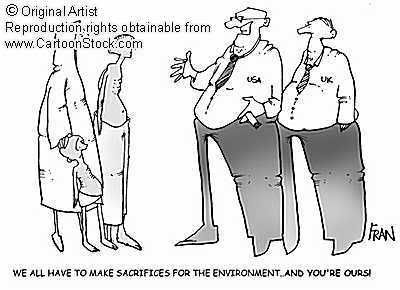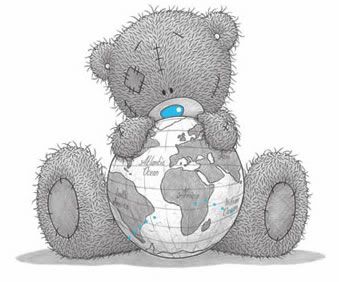The poor as sacrifices for globalization?Vivian Choy, Economic Expert
Cartoon from
CartoonstockThis cartoon very accurately depicts the exploitation of the poor, who have to make way for globalization. In this case I will use agribusiness and subsistence farming as an example of this. Firstly, we need to know that because of neo-liberalism, major trans-national businesses can move their businesses around the world to anywhere that they want to go. For example, if they are producing goods, they can move their production to countries with low labour costs, and the workers that are retrenched in the process are disregarded, neglected and sacrificed for economic benefit. As it is written in
this article,
this has enhanced the interests of shareholders [those who benefit from profits] and reduced the significance of stakeholders [other people who are affected by the activities of the companies, such as workers and local communities].
While agribusiness is more beneficial and effective to the country and it is more profitable as compared to subsistence farming, many a times people forget about the farmers that are chased out and simply remember only the boosting of the country’s economy. Poverty in poor areas, for example in Philippines, is made worse when agribusiness corporations exploit the poor by dominating markets, buying up seed firms, controlling the costs of farmers’ inputs and outputs, and forcing down the prices of food, causing farmers to either only be able to buy less seeds or paying more for them. The poor farmers’ low profits are not enough to support their families, and because of the high loan interest, they are unable to pay off their debts, leading to consequences such as loss of livelihood and unemployment.
However, agribusiness, being a large-scale capital-intensive farming, improves the country’s economy. With farms run by commercial farmers as business, revenue is increased through the sale of outputs. Food is produced by advanced technological means for sale in the market. Farmers make use of technological advances, such as the tractor, to help them in farming, allowing them to work less but still produce more food as compared to subsistence farming, thus improving their working conditions and health in general.
In conclusion, while there are disadvantages of agribusiness, it is a better choice as compared to subsistence farming. Similarly, globalization does have its cons, but it is almost inevitable because it is not easy to live without globalization. Besides North Korea, the only country in such extreme isolation, globalization has reached most parts of the world and globalization would eventually spread to all nations in one way or another, because it is unavoidable if a country wants to progress and grow not just economically but also as a whole.
Resources:
http://en.wikipedia.org/wiki/North_Korea


